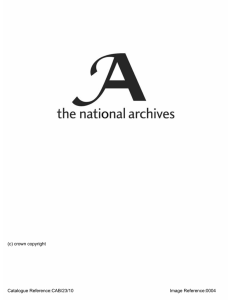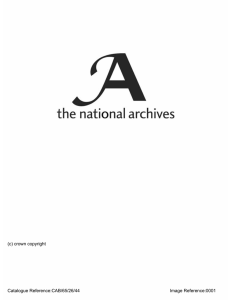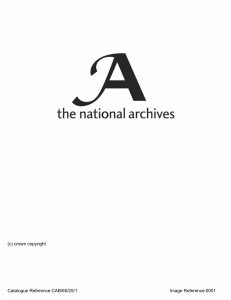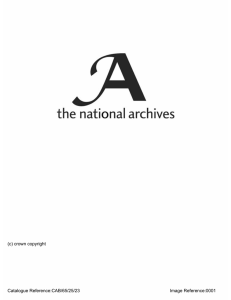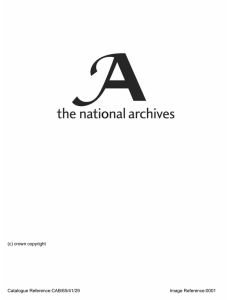(c) crown copyright Catalogue Reference:CAB/23/7 Image Reference:0033
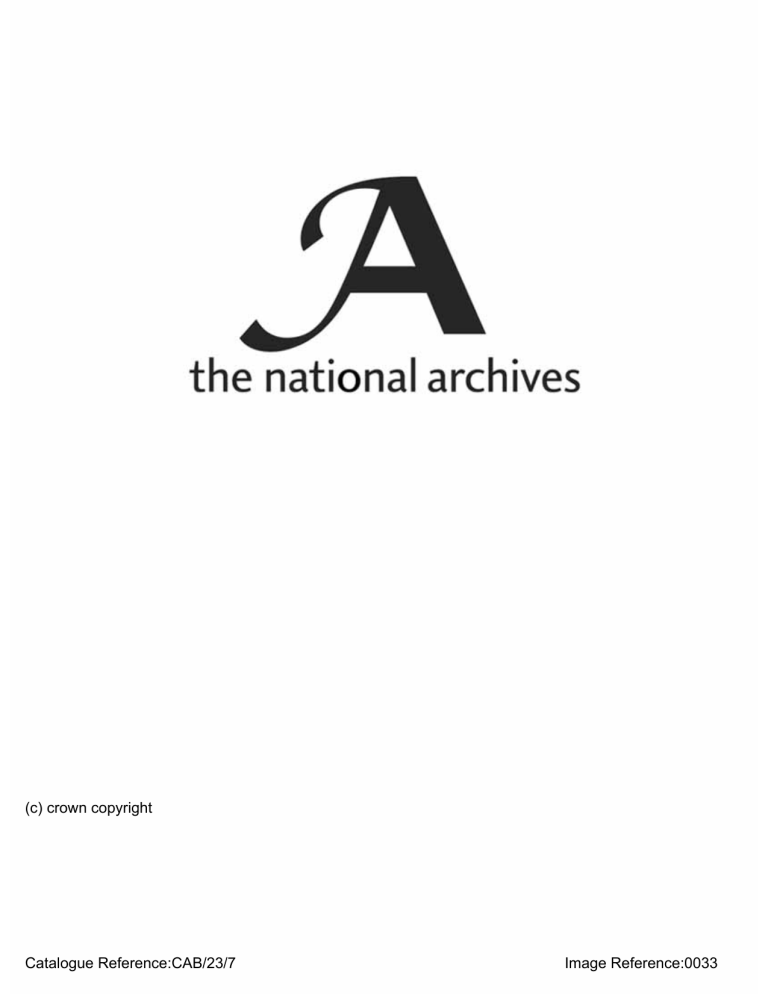
(c) crown copyright
Catalogue Reference:CAB/23/7 Image Reference:0033
[This Document is the Property of jgis Britannic Ma.iesty's Government.
Printed for the War Cabinet. September 1918.
SECRET. a 4
WAR CABINET, 4 7 0 .
Minutes of a Meeting held at 10, Downing Street, S.W., on Friday, September 6,
1918, at 3-30 P.M.
Present:
The P RIME M INISTER (in the Chair).
The R i g h t Hon.
A. B ONAR L AW, M.P.
The following were also present:—
The Right Hon. L ORD R OBERT C ECIL, The Right Hon. W. S. CHURCHILL, M.P.
K.C., M.P., Assistant Secretary of State Minister of Munitions (for Minutes 7 for Foreign Affairs (for Minutes 1 to 9). and 8).
The Right Hon. the V ISCOTJNT M ILNER, S IR L EO G. C HIOZZA M ONEY, M.P., Parlia-
G.C.B., G.C.M.G., Secretary of State mentary Secretary, Ministiy of Shipping for War (for Minutes 1 to 9). (for Minutes 7 to 9).
General S IR H. H. W ILSON, K.C.B., D.S.O., The Right Hon. R. E.
P ROTHERO, M.V.O.,
Chief of the Imperial General Staff (for
Minutes 1 to 5).
M.P., President, Board of Agriculture and Fisheries (for Minute 9).
Mr. W. H.
B EVERIDGE, C.B., Second
Secretary, Ministry of Food (for
Minute 9).
S IR C.
F IELDING, K.B.E., Director-General of Food Production (for Minute 9).
Major the Hon. W . A STOR, M.P., ParliaS IR J . B EALE, K.B.E., Vice-chairman, mentary Secretary, Ministry of Food Wheat Commission (for Minute 9).
(for Minute 9).
S IR
Mr. E. F. W ISE, Ministry of Food (for
G.
C ALTHROP, Bt., Coal Controller Minute 9).
(for Minutes 7 and 8).
j
Rear-Admiral G. P. W . H OPE, C.B.,
Deputv First Sea Lord (for Minutes 1 to 6 ) .
Mr. J . L AMB, C.B., Assistant Under
Secretary for Scotland (for Minute 9 )-l I
Mr. T HOMAS J ONES, Acting Secretary.
Captain L. F.
BTJRGIS, Assistant Secretary.
Major the Hon. W . O RMSBYG ORE, M.P., Assistant Secretary.
The Western.
Front,
1. THE Chief of the Imperial General Staff reported that, as
the result of yesterday's advance, the French had now reached a point east of Noyon, which was only 4 or 5 kilometres from the line held by the Germans on the 21st March, while opposite St. Quentin they were 15 kilometres from the original German line. The civil population of St. Quentin was being evacuated.
General Wilson stated that there was no further news of import ance from'our front, but-there were indications that the Germans were evacuating the civil population between Lille and Douai, but there was no indication that, the civil population were being evacuated from Lille. A good deal of burning was going on behind the
German lines. General Wilson said that he had received a com munication from Marshal Foch's headquarters giving great praise to the British Army and Field-Marshal Sir Douglas Haig for the con duct of the recent-successful operations.
Trans-Caucasia.) 2. The Chief of the Imperial General Staff said that the situa tion at Baku seemed most obscure. Two ships had arrived at
Krasnovodsk. the first giving information that Baku had fallen, and the second that it had not fallen, owing to the arrival of five steamers from Petrovsk with 1 ::',000 Cossack reinforcements.
3. Attention was called to the recent information- showing an increased tendency of the Bolsheviks to support the Germans.
Lord Robert Cecil thought that- it was -unlikely that the
Germ axis, would be able to get any man-power out of Russia. The
Bolsheviks had tried to enforce conscription several times arid had failed, and it seemed clear that the Russians did not wish to fight any more on either side. It was encouraging to note that the
Germans had been imable to obtain men from Courland, Lithuania-, and Esthonia. He -thought, however, that the conscription of 5,000
Russians by the. Local Government at Archangel might have -Via bad effect.
- Lord Milner and the Chief of the Imperial General Staff agreed v:
The War Cabinet decided that— ,
The War Office should send a telegram to General Poole, stating that His Majesty's Government regretted the enforcement of conscription upon Russians at Archangel, and that the
Foreign -Office should send a similar telegram to Mr.
Lindley, in order that he might be informed of this decision.
The Czecho-Slovak
Forces.
4. Lord Robert Cecil expressed the fear that if it were true
that the Czecho-Slovaks were now in control of the whole Trans-
Siberian Railway, the Americans would be reluctant to allow
Japanese forces to remain in Siberia, and would try to get the
Czecho-Slovaks out of Siberia for use elsewhere. It appeared from one of the telegrams that Sir Charles Eliot thought of travelling through from Vladivostock to Omsk.
Mr. Churchill expressed the view that we should under no circumstances allow the Allied control of the Trans-Siberian Railway to be forfeited.
5. The Chief of the Imperial General Staff reported the receipt of a message from General Diaz regarding the situation on the
Italian front. General Diaz had returned to Italy on the previous day.
Submarines, 6. The Deputy First Sea Lord reported that the U.S.
" Chester" had sighted an enemy submarine near the Lizard on the 5th September. The " Chester " attempted to ram the sub marine, but missed by 20 feet. The " Chester" passed right over the submarine and dropped four depth charges, which possibly damaged the submarine.
Gas Coal
London.
1
for 7. The War Cabinet approved the recommendations of the
President of the Board of Trade for the supply of gas coal to
London throughout the coming winter (Paper G.T.-5543), and authorised—
Sir Joseph Maclay to make the necessary shipping adjust ments.
The Coal Situation.
8. With reference to War Cabinet 468, Minute 13, the Prime
Minister stated that he had seen a prominent miners' agent, who was of opinion that it might be possible to increase the coal output by 5 per cent., and who had suggested the desirability of meetings being addressed by the President of the Board of Trade and the
Coal Controller in the mining ' areas themselves rather than in
London.
Sir Guy Calthrop stated that the output for August showed a reduction of I f million tons on the output of the corresponding period in 1917, and was only 400,000 tons better than that of Jrdy
1918.
Mr. Churchill stated that he was proceeding with the prepara tion of his Coal Budget for 1919 as fast as possible, and hoped to have it ready in a week or ten days. He was advised that, in case of fogs in winter, the stocks in certain areas were dangerously low.
The War Cabinet decided—
(a.) To adjourn the discussion pending the result of further enquiries by the Coal Controller.
(6.) To ask' the Secretary of State for War to ascertain the number of coal-miners in the army classed as B 1.
Food Imports into the United King dom for the Cereal
Year 1918-19.
9. The War Cabinet had before them a memorandum by the
Food Controller (Paper G.T.-5612) relating to food imports into the
Urrited Kingdom for the cereal year 1918-19.
Major Astor, representing the Food Controller, who was detained at Derby, stated that the Ministry of Food had put in a request to the Allied Maritime Transport Council for the importation of 13'5 million tons of food for the cereal year 1918-1919, but it was realised that they might have to make a reduction on that figure on the ground of urgent military necessity. The Food
Controller was prepared, by taking 500,000 tons off feeding stuffs, and 600,000 tons off cereals (if the reserves of the latter were reduced from thirteen to nine weeks' consumption), and
200,000 tons off oddments, to bring their total requirements down to 12,200,000 tons. The Allied Maritime Transport Council had informed the Food Council that provisionally, and pending the examination of other programmes, they proposed to provide tonnage for a total programme of 18'5 million tons, of which the British share would be 10"5 million tons.
Lord Robert Cecil stated that these figures were based on the fact that we might have a larger harvest this year than last, and until we knew what the harvest was going to be the Allied Maritime
Transport Council did not feel justified in going beyond the minimum requirements of each country. The Council had received instructions to bring over as many American troops as possible, and this fact had weighed with them in their deliberations. It would be regrettable if the War Cabinet rejected the finding of the
Transport Council without any further consultation with their
Allies.
The Prime Minister said that the United States had promised that, by February 1919, they would bring over American troops in their own transports. If it were possible for us to live on our stocks to a greater extent than ever before up to the month of February, then our own ships would be freed from the American transport work and would be able to make good the deficit. It might be possible to live for one month on the 13'5 standard, and import at the 10 5 standard ; after that month the Allied Maritime Transport
Council could again consider the whole question in the light of the further knowledge they would then have at their disposal.
Mr. Prothero said that he wished to know if his requirements wdth regard to feeding-stuffs would be met. It was essential to let the farmers know if they could expect feeding-stuffs, otherwise they would rush their cattle on to the market within the next month, which would consequently result in a shortage at a later period.
Sir C. Fielding urged that, in the interest of the milk supply, it was essential to know what the feeding-stuff position would be, as milk-feeding began at once.
Sir Leo Money laid emphasis on the provisional character of the figures of the Allied Maritime Transport Council. The Council had not decided either that the Allies should definitely import at the rate of 18
-
5 million tons, or that we should have 10'5 million tons.
These figures were tentative and provisional, and it was clearly understood that they were subject to revision in a few weeks' time, when harvest and other estimates were available.
The War Cabinet decided that—
(a.) For the next month the Food Controller should ration the country at the 13*5 million standard, or such other standard as he thought fit, imports during that month being arranged on the basis approved by the Allied
Maritime Transport Council.
(b.) The Food Controller should be authorised to diminish the cereal reserve during that period, so far as necessary, to secure an import of feeding-stuffs.
2, Whitehall Gardens, S.W.,
September 6, 1918. o

